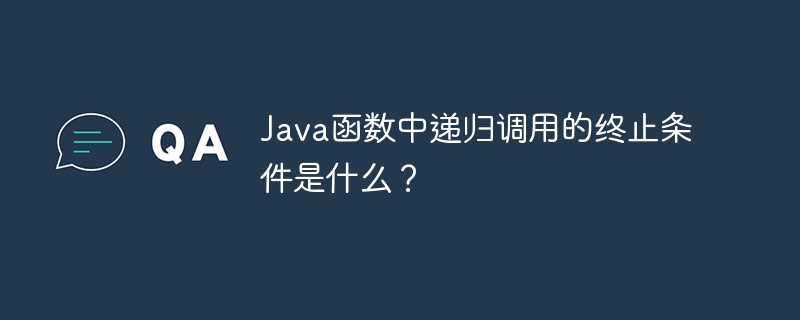Home >Java >javaTutorial >What are the termination conditions for recursive calls in Java functions?
What are the termination conditions for recursive calls in Java functions?
- WBOYWBOYWBOYWBOYWBOYWBOYWBOYWBOYWBOYWBOYWBOYWBOYWBOriginal
- 2024-05-02 22:18:01708browse
The termination condition of recursive calls in Java is the condition under which the function returns a result without further recursion. Common termination conditions include: Baseline scenario: Check simple conditions and return the result if they are met. Decrement Argument: Decrement the argument in each recursive call until it reaches zero or other predefined value. Independent variable comparison: Check whether the independent variable meets specific conditions, and return the result if it does.

Termination conditions for recursive calls in Java functions
Recursion refers to the function call itself. When using recursion in Java, you must ensure that there is an explicit termination condition to prevent infinite recursion.
Termination condition
The termination condition for a recursive call is the condition under which the function returns a result without further recursion. Common methods are:
- Baseline scenario: The function checks a simple condition and returns the result if it is met.
- Decrease argument: The function decrements an argument on each recursive call until it reaches zero or other predefined value.
- Comparison of independent variables: The function checks whether the independent variable meets a specific condition and returns the result if it does.
Practical case
The following is a Java example of the Fibonacci sequence recursive function using the decreasing argument termination condition:
public static int fibonacci(int n) {
if (n == 0 || n == 1) {
return n;
}
return fibonacci(n - 1) + fibonacci(n - 2);
}In this example, the function checks whether the baseline condition is met (n is 0 or 1), and if so, returns the result. Otherwise, it recurses on itself, decrementing the argument n until the baseline case is satisfied.
Other termination conditions
In addition to the above methods, there are some additional termination conditions that can be used for recursive calls. These include:
- Exception Throwing: When a function call does not conform to the specification, an exception can be thrown to terminate the recursion.
- Flag variable: A flag variable can be set to indicate when recursion terminates.
- External checks: External functions can check the internal state of a recursive function and decide whether to terminate it.
IMPORTANT
- Make sure there is always a terminating condition to prevent infinite recursion.
- Choose the best termination condition method based on the specific problem.
- Test recursive functions to ensure they terminate correctly in all possible situations.
The above is the detailed content of What are the termination conditions for recursive calls in Java functions?. For more information, please follow other related articles on the PHP Chinese website!

